Humanity and the Wild. Hellen Opens Her Home for Monkey Pets
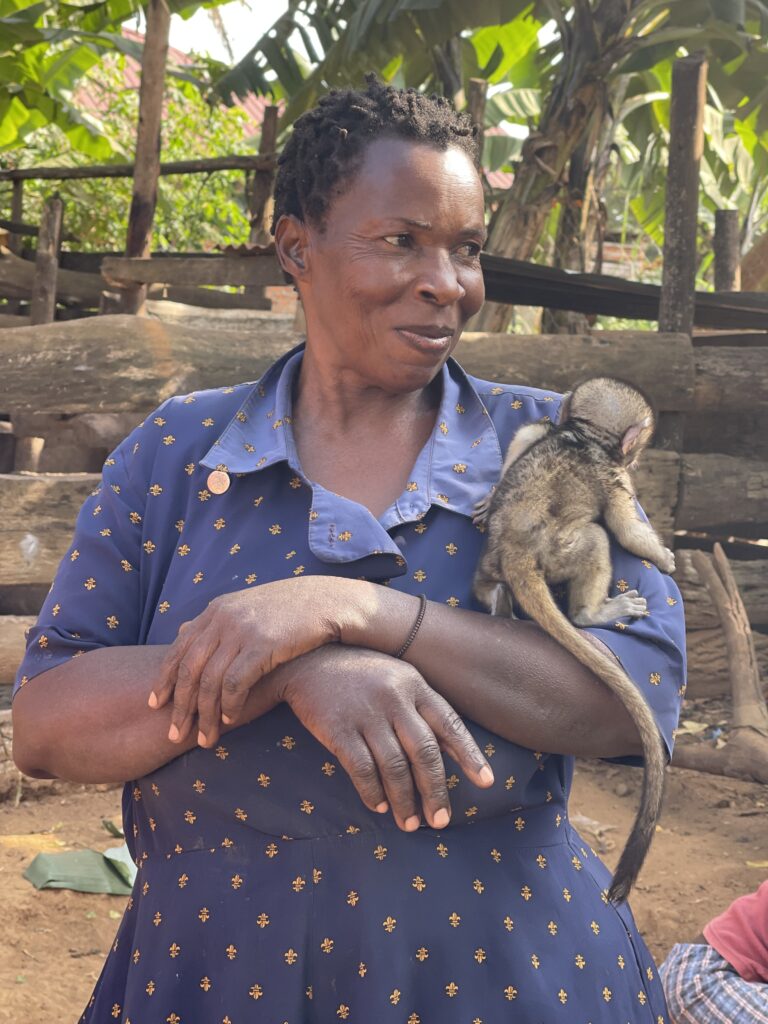
Humanity and the Wild. Nankya Opened Her Home for Monkeys
By Culton Scovia Nakamya
At the shores of Lake Victoria, love intertwined a captivating story, bridging humanity and the wild.
One Sunday afternoon, Hellen Nankya’s voice echoes through the treetops at her home, calling Ssegawa for lunch. One can be mistaken to think she is calling one of her sons, but no, it is her monkey pet named Malcom Ssegawa Mutebi.
Beneath the watchful sun, they share entertaining moments. It keeps jumping over from one person to another, like a baby seeking attention from a caretaker. Whether Nankya or any family member is cooking, washing dishes, cleaning the house, collecting water, or going to a grocery shop, Ssegawa is wrapped along otherwise, the baby monkey will distract until it’s given the attention. Nankya gets tired of putting the wild creature at the back, sometimes, she makes it cling on the arms or the legs, whichever spot they both find comfortable, then work continues.
Ssegawa is not yet a year old but experiences a level of care one might only reserve for their own child. The baby monkey feeds through a baby bottle. He is always fed on milk, bread, and bananas.
“Ssegawa knows where we keep the bottle. If he is hungry, he will go for the bottle, and carry it to you. Then you know you have to feed him.”
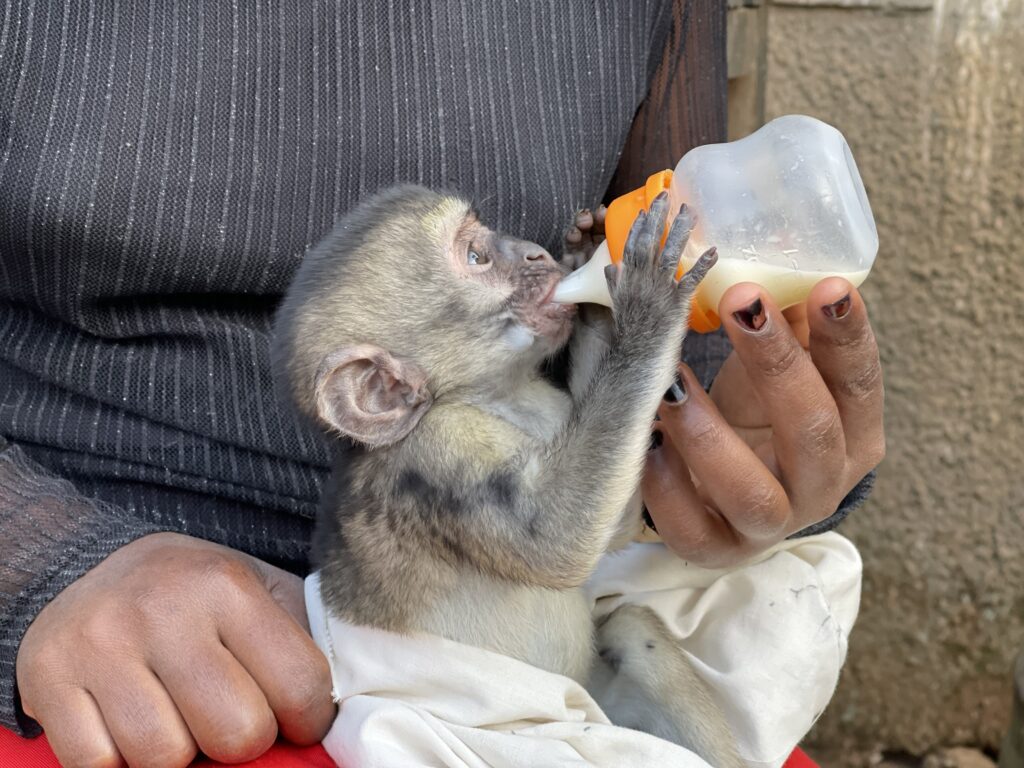
It is routine, after lunch, Ssegawa has to rest. Many times, Nankya sings lullabies for Ssegawa’s siesta, and as she does this, you can spot a strong union beyond description. In their bond, a connection deeper than words is visible.
Nankya put up an exceptional bed for both Ssegawa’s siesta and the night rest. It is a special spot at the sofa in their living room, with well-organized baby sheets. Like a cry baby, the baby monkey sometimes rejects lonely nights and Nankya or her daughter Natasha has to share a bed with their wild friend.
How It All Started:
Nankya made a remarkable decision to grow her connection with these creatures because of the love she has for wild animals.
In January 2020, she stumbled upon an orphaned Monkey close to her garden. The little monkey’s mother had been killed by a trapping machine from a neighbor’s garden. Nankya felt concerned and opened her heart and her home to the little monkey. After taming it, she named the monkey Kabugo Michael.
“Can you ignore an abandoned child? I did the same. I knew leaving the baby monkey in the garden meant death. I found it in my garden. When I noticed it was left alone and bruised, I used my body wrap to carry it home. I then got an empty box, got a piece of mattress, and put it to rest. I could feed it on bread, milk, and bananas until it grew stronger. We then got it out of the house and gave it a permanent home at the avocado trees. That’s where it stays for the last three years”. She says.
In April 2023, Nankya received another “bundle of joy”. The baby monkey was delivered by residents of the same village who found it lonely and abandoned.
“They called my daughter and told her about the baby monkey. They had picked it up from the roadside, less than a kilometer away from my home. They inquired if I was able to look after it and I responded in the affirmative. At first, I was afraid because it was too young but I gave it a try and here we are”. She said.
And so, a new family took root, Ssegawa joined Kabugo and have lived together since.
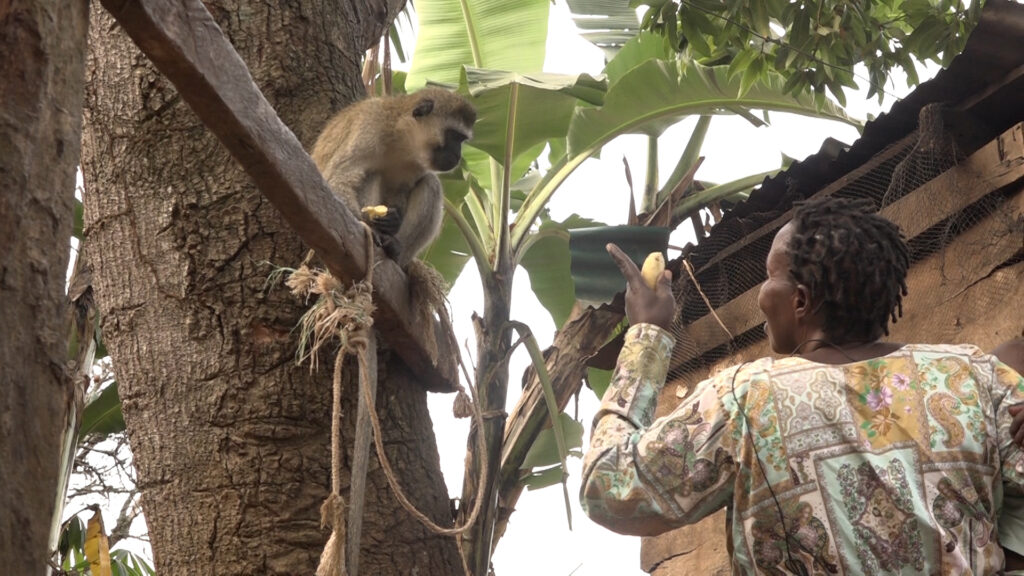
Through Nankya’s tender care, you can see love blossoming between species.
She has developed an extraordinary kinship with monkeys. She has found herself captivated by their lively antics, their acrobatic leaps reflecting the excitement in her own heart.
Kabugo the elder, feeds on everything they prepare at home but meat and bananas are his favorite though the two monkeys feed on every human meal. Tied on a rope at the avocado tree in the compound, he keeps jumping from one tree to the other. Kabugo is the guard of the home, making alerts whenever a stranger comes in. he also protects Nankya’s poultry from predators.
Like any other pet, Nankya is in love with her monkeys, she believes they deserve a better life than what they live in the wild.
“I love Monkeys. And I love seeing them happy. As a family, we have learned how to stay with them.” She says
While Nankya has three children at home, including a 4-year-old granddaughter, her home has turned into a haven where humans and the wild have surpassed the boundaries of language, connecting the two life forms. The two companion monkeys respond to Nankya’s commands and assignments. They have mastered her language, gestures, and movements.
Nankya’s daughter, Natasha is the friendliest to the monkeys at home. Natasha has been sleeping with the baby monkey since day one.
“She welcomed it and it felt loved. She feeds it, washes it, and sleeps together”. Says Nankya.
As days unfold, Nankya and her monkey companions share laughter and peaceful understanding. Ssegawa’s presence is like the baby at home, seeking attention but offering company and solace throughout the day.
“They know when I am happy and when I am not. I taught Ssegawa how to suck its feet so it doesn’t interfere with our work when we are busy”.
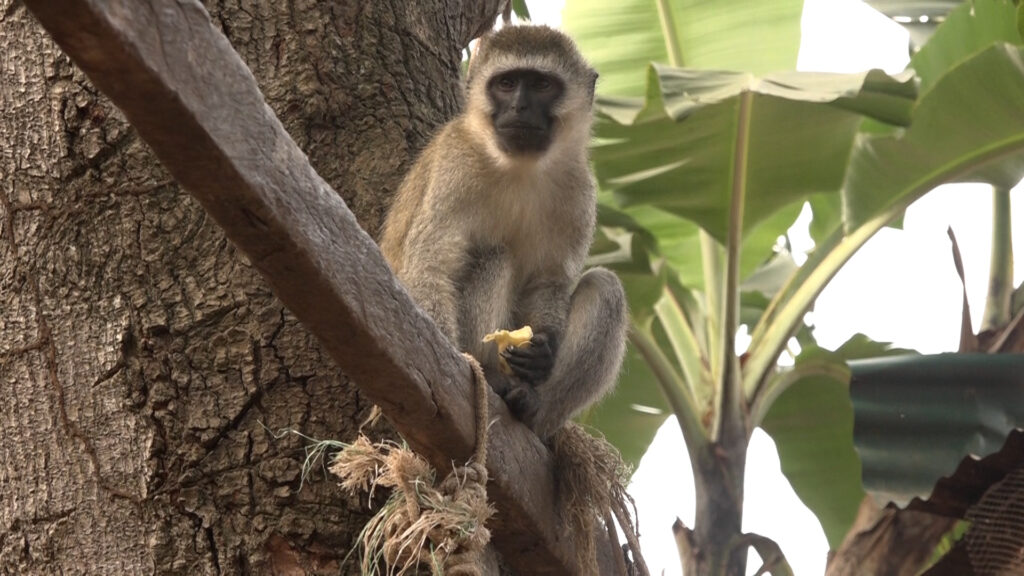
A Crime? The Legal Dilemma:
Living with wildlife in Uganda is regulated. Individuals seeking to live with wildlife need a license from the designated authority.
Paul Twebaze the public relations officer of the Wildlife Conservation Society highlights the potential risks associated with living with wild animals. He stresses the need for regulatory measures.
“The monkeys are likely to contract diseases of humans or either way, the family can get diseases from the monkeys. It is not possible that she can regulate monkeys, it is likely they can interact with other monkey families. In the event that the family catches a cough, or tuberculosis which is common, transfers it to the monkey, it can easily transfer it to other wild monkeys if they interact. Then you may end up affecting all the monkeys in the district which can be costly to manage”. Says Twebaze.
Twebaze advises reintegrating the monkeys into a wildlife care center for their well-being and the protection of local wildlife.
“We have very many people abusing the Wildlife Act and that’s dangerous. The natural resources officer needs to act and take necessary measures. Those monkeys need to be taken to a wildlife care center to reintegrate and rehabilitate them to live wild”. Advises Twebaze.
Nankya says she has attempted several times to let go of the monkeys but they always return to her.
Nankya’s neighbors keep wondering why she keeps monkeys at home. To some, it’s an abomination but to others, it’s a sign of compassion.
Watch the video here.
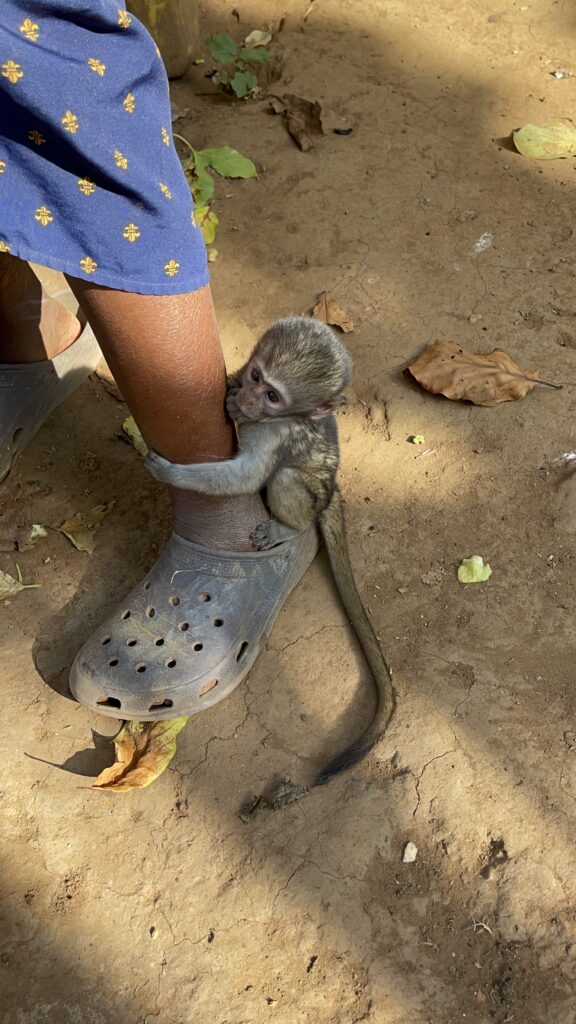
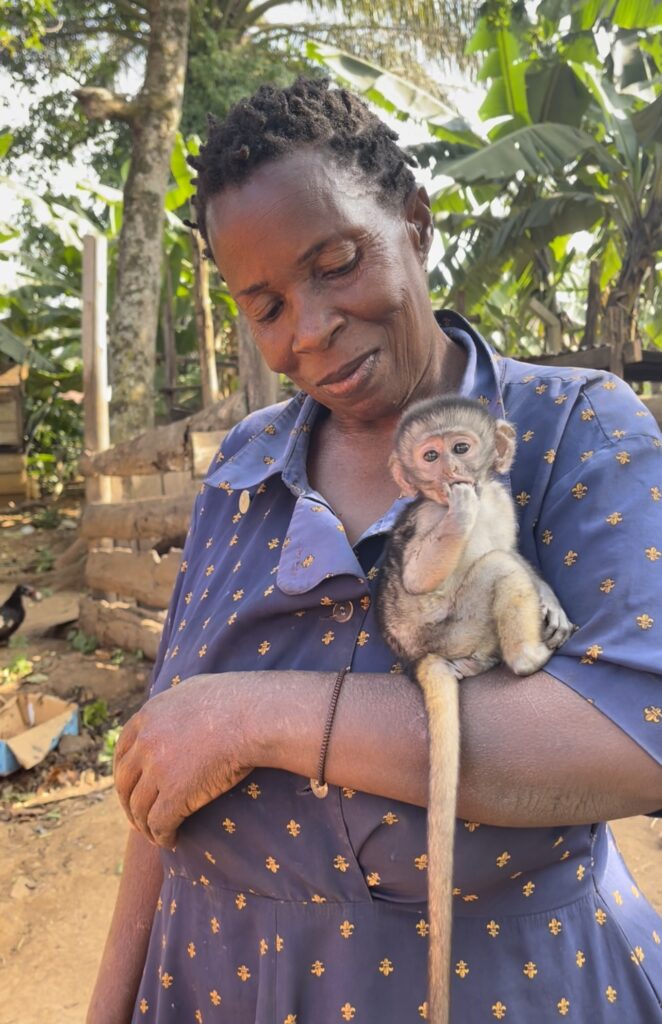

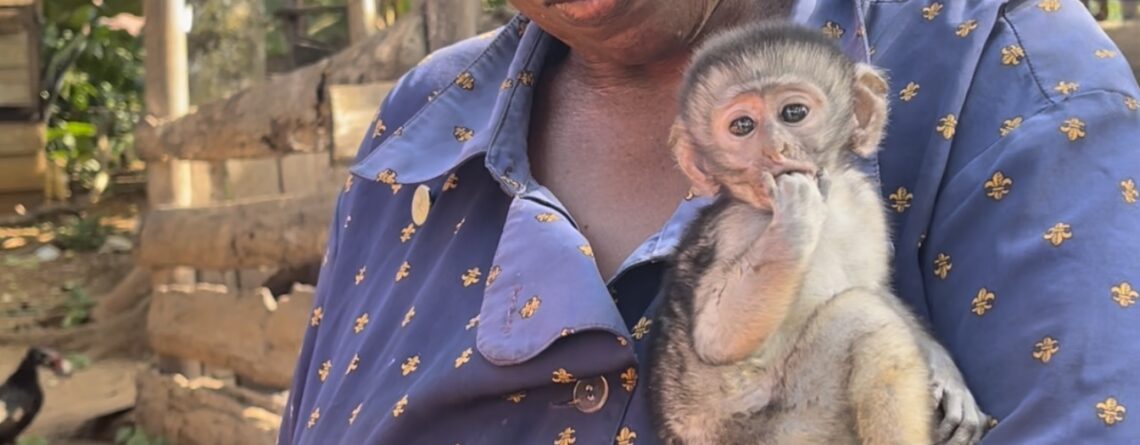
Comments (4)
Ya It’s a Nice Initiative because I Also Understand That The Wild Is Calling.
Hope We Emphasize It Morle And Moreeeeew.
I can relate the love between the family and monkeys
Humanity at the best
The love of nature is so powerful. Asante